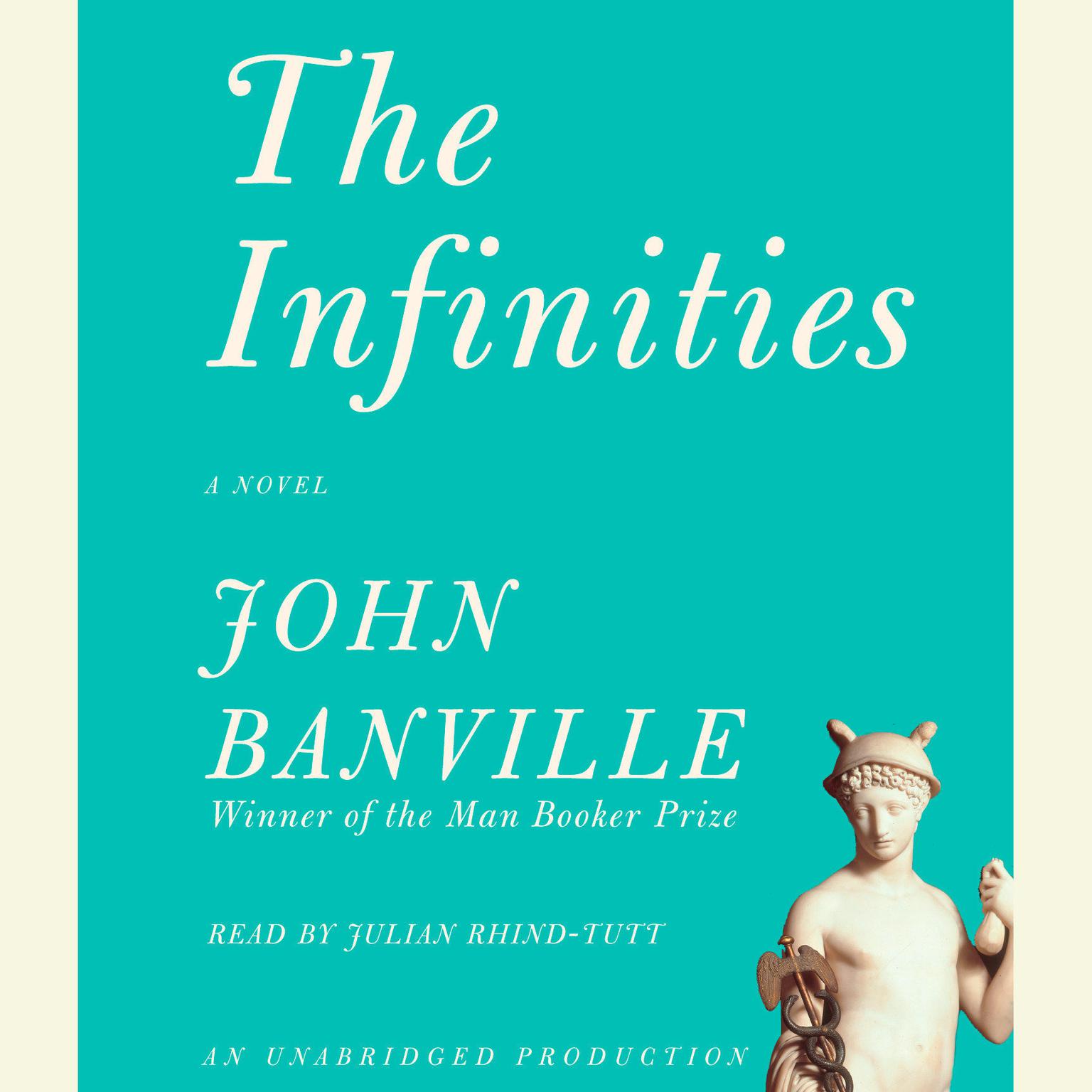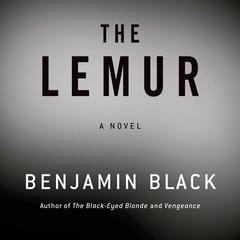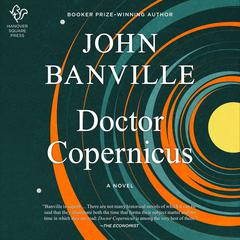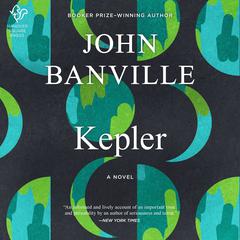 Play Audiobook Sample
Play Audiobook Sample
The Infinities Audiobook
 Play Audiobook Sample
Play Audiobook Sample
Quick Stats About this Audiobook
Total Audiobook Chapters:
Longest Chapter Length:
Shortest Chapter Length:
Average Chapter Length:
Audiobooks by this Author:
Publisher Description
On a languid midsummer’s day in the countryside, old Adam Godley, a renowned theoretical mathematician, is dying. His family gathers at his bedside: his son, young Adam, struggling to maintain his marriage to a radiantly beautiful actress; his nineteen-year-old daughter, Petra, filled with voices and visions as she waits for the inevitable; their mother, Ursula, whose relations with the Godley children are strained at best; and Petra’s “young man”—very likely more interested in the father than the daughter—who has arrived for a superbly ill-timed visit. But the Godley family is not alone in their vigil. Around them hovers a family of mischievous immortals—among them, Zeus, who has his eye on young Adam’s wife; Pan, who has taken the doughy, perspiring form of an old unwelcome acquaintance; and Hermes, who is the genial and omniscient narrator: “We too are petty and vindictive,” he tells us, “just like you, when we are put to it.” As old Adam’s days on earth run down, these unearthly beings start to stir up trouble, to sometimes wildly unintended effect. . . . Blissfully inventive and playful, rich in psychological insight and sensual detail, The Infinities is at once a gloriously earthy romp and a wise look at the terrible, wonderful plight of being human—a dazzling novel from one of the most widely admired and acclaimed writers at work today.
Download and start listening now!
"More of an extended dreamscape than a novel. Banville has a gift for luminous description that occasionally gets the better of him but usually works quite well. This was the perfect post-dissertation leisure read, but don't go in expecting a strong commitment to plot. "
— Ed (4 out of 5 stars)
Quotes
-
“Banville is a glorious stylist whose prose holds sustaining pleasures…You keep turning the pages just to gather more of these bouquets. But when Banville waxes philosophic he’s even better; he’s heartbreakingly poignant…[A] rich and strange novel, as ambitious in its reach as it is delightful to read. This god has outdone himself.”
— Newsday -
“A major work of Shakespearean imagination, Banville’s fifteenth novel is among his best.”
— Austin American-Statesman -
“Like Nabokov, Banville has a wide-ranging intellect and a rather godlike view of the power of fiction—and, like Nabokov, he’s got the goods to back it up. The Infinities is an inventive melding of myth and realism, a sly and poignant tale of lust and loss, but above all it is a joy to read for the sheer beauty of its language.”
— St. Petersburg Times -
“Characteristically gorgeous.”
— Milwaukee Journal-Sentinel -
“Banville may have surpassed himself with the brilliance and introspection of his writing in [this] mythic novel.”
— Buffalo News -
“Banville’s best and brightest work…Masterful.”
— Bookforum -
“Spellbinding.”
— Finacial Times -
“A Midsummer Night’s Dream of a story…Pure pleasure.”
— Minneapolis Star Tribune -
“Intriguing, complex, and ultimately elusive, The Infinities manages, through divine sleight of mind, to bring glimmers of possibility to its dark characters: as such, it is a novel for our hopeless times.”
— Irish Times -
“The Infinities is a Beethoven string quartet of a novel. It deals with huge ideas—plenty of them—and in doing so, breaks new ground in its own medium…A masterpiece of a book.”
— Daily Telegraph (London) -
“Mesmerizing…The Infinities is rife with mischief, as well as godly/authorial omniscience, irony, and wordplay, but what warms and anchors it is its humanity.”
— Miami Herald -
“Entrancing…Banville achieves real depth in this alternately grave and bawdy exploration of the nature of time, the legacy of grief, and the costs and sources of inspiration.”
— San Francisco Chronicle -
“Dazzling…Banville is, without question, one of the great living masters of English-language prose. The Infinities is a dazzling example of that mastery.”
— Los Angeles Times -
“A writer of protean powers…[Banville] retains his standing as one of the world’s most exquisite stylists in this sublimely acerbic and mischievous tale about the timeless mysteries of love and death…With odd details (cars powered by seawater) and intricate musings over the complexities of consciousness and the cosmos, Banville creates a bewitching world in which to ponder what it is to be human.”
— Booklist (starred review) -
“In his first novel since the 2005 Man Booker Prize-winning The Sea, Banville reminds the world that he is one of the best prose stylists at work today…Choosing introspective character description over rich plotlines, Banville here puts his writing prowess on full display.”
— Library Journal -
“Even more pristine than his Booker-winning The Sea.”
— Publishers Weekly (starred review) -
“[Banville’s] latest novel…is haunting, beautiful, and perhaps even stranger than those that preceded it…Ultimately, The Infinities is a kind of mystery novel, one that respects its mysteries too much to try to resolve them. The real subject of this unforgettable, beautifully written book is nothing less than the enigma of mortal existence. And who better than a cast of lusty, bemused, mischievous, and quite possibly imaginary immortals to cast a new light on that?”
— Washington Post -
“In a narrative that makes intricate use of this material’s mythic, dramatic, and philosophical possibilities while remaining improbably comedic…Banville manages to write compassionately about his mortals without sacrificing his deities’ exalted wit and wisdom. And always, even as this story prepares to takes tragic turns, his agility is abundantly evident.”
— New York Times -
“Beautifully written, perversely entertaining, and well worth a close look.”
— Kirkus Reviews
Awards
-
A 2010 Washington Post Best Book for Fiction
The Infinities Listener Reviews
-
" I like the idea of taking the stuff at play in The Infinities---Greek gods interfering with a family, an alternative but closely related world, and a theoretical mathematician/physicist as a main character---and using it all to reflect on relationships and the ordering of our world. But I thought the book was a little slow and stuffy for my tastes. "
— Seth, 2/10/2014 -
" While it took a little bit of reading to get into this book, I thoroughly enjoyed it. In fact, this is one of the rare books that I am already looking forward to reading again. "
— Karl, 2/10/2014 -
" Silly book. If I am charitable I will say I missed the point entirely. "
— John, 2/5/2014 -
" Clever and funny, I could easily see it adopted into a screenplay. On the stage it would be brilliant. Has the feeling of an Oscar Wilde play crossed with Gaiman's "American Gods". Takes a bit to get started but excellent middle and a decent ending. "
— Paul, 2/4/2014 -
" I've read this one three times because I teach it in my ENGL 463 course. It's quirky but interesting. He's not my favorite author, still, he combines literary qualities with science and mythology in an interesting and provocative way. "
— Joanne, 2/2/2014 -
" Does anyone write a richer more mellifluous prose than John Banville? Still, at times I find his style too oleagenous for my taste, to use one of his favorite words (moreover, his obsession with "f" alliteration can sometimes tires). This novel, very much in the Irish tradition, deals with a dysfunctional family--or, actually two, dysfunctional families, the second being the family of Greek gods who overlooks and at certain points interferes with the earthly family. The narrator is Hermes who has to watch his father Zeus's lustful behavior, even as he watches over a mortal family gathered at their father's deathbed. Mortals are sad beings. Everyone in the Irish family in question is in some way a loser, but ultimately the gods are a sadder lot, trapped as they are in their cold immortality. It is our human capacity to love and to die that makes us superior to the gods. Banville's novel is a work of great imagination, philosophical insight, and humor. Despite all its merits, "Infinities" is sometimes confusing, with the slippage between divine and human voices, which seems to be a critical aspect of the novel, not always easy to follow. "
— Stephen, 2/1/2014 -
" i liked this more than you'd expect. yes, the plot moved slowly and there's still one piece that I am confused about, but the language was lush and beautiful. "
— Anne, 1/29/2014 -
" Classic Banville, this time with Ancient Gods thrown in for good measure. The usual themes of love, death and tenuousness, but somewhat lighter than times past. Plot line as faint or fainter than ever. "
— Mark, 1/18/2014 -
" I really enjoy this book. Old dying mathematician, his family, and Greek gods above - what could be better for a great book written by a real master. "
— Boris0311, 1/12/2014 -
" It is a pleasure to read anything by John Banville. Interesting story, as usual his writing is masterful, maybe not his best book, but an amusing, creative story. I listened to the book, audio is an excellent way to appreciate his prose. "
— Mary, 1/7/2014 -
" It was a very strange and original and unexpected combination of bawdy phrases and elegant clauses, and somehow it worked. Can't say if I liked it or not, I'll have to read his 'The Sea' to determine... "
— Maddy, 11/26/2013 -
" I enjoy dark humor, which is why this caught my eye. But I found this be dark (minus the humor). As always with Banville, the language is clever, even arch, but the story was too sad, the characters simply miserable. "
— Kathleen, 11/12/2013 -
" Could not get into it enough to finish. "
— Allison, 6/25/2013 -
" I'm honestly not sure I could have gotten through this book if I had actually been reading it--and I almost gave up on the audiobook fairly early on--but by a quarter of the way in, I was hooked. It was odd and amusing, and I was pleasantly surprised by how it ended. "
— Amy, 8/11/2012 -
" I loved the beginning of this book! Loved the idea, the writing, the way it made me think about humanity. However, it quickly became smart but without enough plot to drive it. Enjoyable, but not one I'd necessarily recommend. "
— Carrie, 4/17/2012 -
" The premise was fun and the read was occasionally playful, however, there was nothing compelling about this book for me. One day I found myself choosing to iron clothes rather than read. Nonetheless, I finished and was no more satisfied at the end. "
— Pamela, 4/2/2012 -
" Not exactly what I expected. I certainly didn't enjoy it like I thought I would. It was pretentious, like an overacting actor. "
— Sonia, 11/10/2011 -
" Meh. The prose was lovely, but the plot was lacking. "
— Traci, 9/10/2011 -
" I like the way he writes. In this month's New Yorker, there is a review of his latest book, citing his style as being "pretentious and dramatic", but I like it. "
— Jaw, 7/3/2011 -
" Much to admire in the writing here. There were more than a few sentences that I reread just to savour their deliciousness. Too bad the story itself was a snooze, though. "
— Prospero, 6/13/2011 -
" Odd, but enjoyable. Greek gods cause mischief in lives of an English family as the patriarch is dying. "
— Gretchen, 3/31/2011 -
" I think I read this too fast, by which I mean, I am sad the reading of this book is finished. Banville is in a category and class all of his own. "
— Jennifer, 2/27/2011 -
" Heavily ladened with endless description that is at once burdensome and vacuous this book suffers with its overlapping perspectives and self-centered characters. The gods and family meditate and interact as they await the death of their patriarch and nothing much happens. "
— Jessie, 2/3/2011 -
" odd story with mortals and greek gods, but I liked it. it read very much like a play. "
— Cristianne, 1/18/2011 -
" i love reading john banville: one needs a dictionary nearby for all the delicious words. his sentences can be read aloud, almost like poetry. this story i didn't enjoy as much as say, the sea. but he is so enjoyable to read i'd recommend it anyway. "
— Kimi, 1/6/2011 -
" i liked this more than you'd expect. yes, the plot moved slowly and there's still one piece that I am confused about, but the language was lush and beautiful. "
— Anne, 12/28/2010 -
" Definitely a talented writer, but had a hard time following the story line, and didn't quite understand the point of it. Maybe too deep for me at this particular time? Imaginative but didn't get the use of the mythical gods and their intervention in the Godley family's lives. "
— Lisa, 12/28/2010
About John Banville
John Banville is the author of more than twenty novels, as well as nonfiction and plays. Time Pieces was a New York Times bestseller, and The Sea won the 2005 Booker Prize. He has also won the Franz Kafka Prize, the Irish PEN Award for Outstanding Achievement in Irish Literature, the James Tait Black Memorial Prize for Best Novel, and the Prince of Asturias Award, Spain’s most important literary prize. He was born in Wexford, Ireland, in 1945, and lives in Dublin.
About Julian Rhind-Tutt
Julian Rhind-Tutt is an actor and voice artist. His audiobook narrations have earned five AudioFile Earphones Awards, and he has been a finalist for the prestigious Audie Award. His film appearances include roles in The Madness of King George, The Saint, Les Misérables, Notting Hill, and Tomorrow Never Dies, while his television credits include Reckless, Dangerfield, and Richard II. His stage work includes Editing Process, The Way of the World, Catherine Howard, and as the Duke of York in The Madness of George III. He is also the recipient of the Carlton Hobbs Award from BBC Radio.























